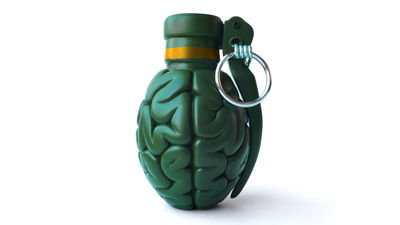Depression progresses and the brain will degenerate by suffering for years

byChris Barbalis
Canada's Center for Addiction and Mental Health (Mental Health and Addiction Center / CAMH) has found that brains change by suffering from depression for years. The results of this study show that "Depression depends on how it progresses, as with Alzheimer's disease," different treatment is required.
Association of translocator protein total distribution volume with duration of untreated major depressive disorder: a cross-sectional study - The Lancet Psychiatry
http://www.thelancet.com/journals/lanpsy/article/PIIS2215-0366(18)30048-8/fulltext
Over years, depression changes the brain, new research shows
https://medicalxpress.com/news/2018-02-years-depression-brain.html
Research team of CAMH by Professor Jeff Meyer who studies psychiatryPositron emission tomography(PET)I scanned the brains of depressed patients with the test method. Present in the cerebrospinal spaceMicrogliaIt is said that when an individual is traumatized, the immune cell shows activation and inflammatory reaction, but if this inflammatory response is excessive it is said to be related to other diseases such as "depression". Activation of microglia also increases the production of protein called TSPO. In this survey, TSPO level was observed as PET as a marker of inflammation.
In the study, 25 subjects with symptoms of depression for more than 10 years, 25 subjects with a symptomatic period of depression within 10 years, and 30 comparison groups without depression symptoms were PET As a result, the group with symptoms of depression for more than 10 years had TSPO level as high as 30% in different brain regions compared to the group of less than 10 years. Of course, compared to subjects without depressive symptoms, the group with depressive symptoms over the long term is said to have a higher TSPO level.

byAsdrubal luna
"As with Alzheimer's disease and Burkinson's disease, in diseases where large inflammation occurs in the brain, the brain will degenerate with progression," Professor Meyer says.
Depression is not considered a brain degenerative disease, but this study is evidence that "depression is progressive and not static disease". Although the same approach is taken for treatment of depression for years, the researchers think that different approaches should be carried out depending on the stage like cancer and the like.
Meyer and colleagues continue to investigate what kind of treatment is suitable for patients suffering from depression for a long time. Treatment with the target of inflammatory response is considered as an option and drugs that suppress inflammatory reactions used in the treatment of other diseases may be applied to major depressive disorder.

Related Posts:
in Science, Posted by darkhorse_log







